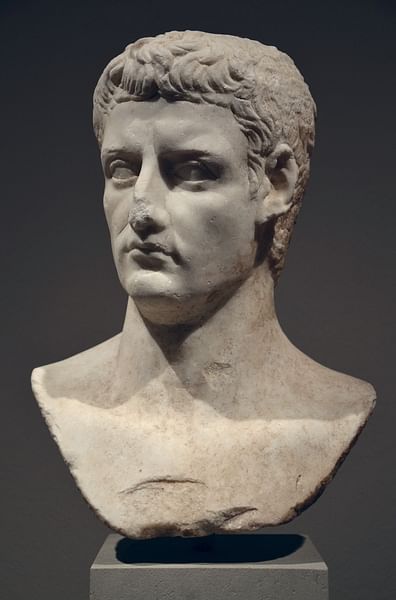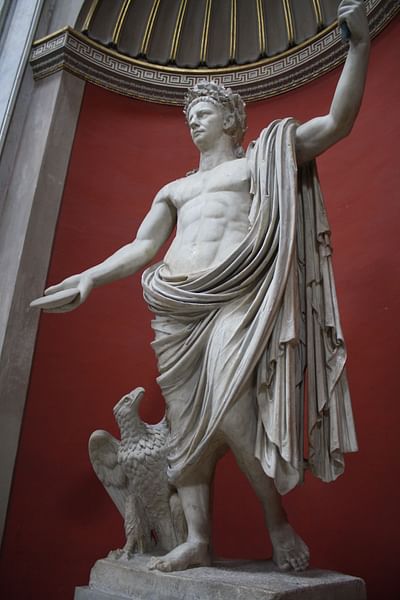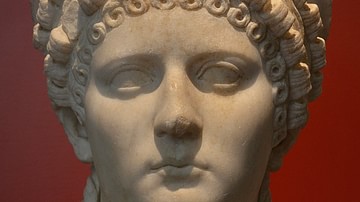
Claudius was Roman emperor from 41 to 54 CE. After the death of Emperor Caligula (37-41 CE) and his family at the hands of the Praetorian Guard, the future Emperor Claudius was found quivering behind a set of curtains, fearing for his own life, and named emperor. Historian Cassius Dio wrote: "At first the soldiers, supposing that he was someone else or perhaps had something worth taking, dragged him forth; and then, on recognizing him, they hailed him emperor and conducted him to the camp. Afterwards they together with their comrades entrusted to him the supreme power ..." (60.1)
Early Life
Claudius, or Tiberius Claudius Caesar Augustus (10 BCE - 54 CE), was Caligula's uncle (brother to Germanicus) and had always been thought of as being dimwitted (even his own mother agreed with this assessment) which is the reason why some believe he remained alive as long as he did. He drooled, stammered, and limped - an easy target for cruel jokes by the ever-abusive Caligula. According to his The Twelve Caesars, ancient historian Suetonius said Claudius' mother Antonia (daughter of Mark Antony) considered her son “a monster, a man whom Mother Nature had begun work upon but then flung aside.” When she accused someone of being stupid, she would say, “He is a bigger fool even than my son Claudius” (Life of Claudius, 3.2.).
His grandmother, Livia Drusilla, could not bear to look him in the face. When it was predicted that Claudius would rule the empire, his sister Livilla "prayed aloud that the Roman people might be spared so cruel and undeserved a misfortune" (3.2.). Later in life, Claudius explained his feeblemindedness as an act. According to Suetonius, “Instead of keeping quiet about his stupidity, Claudius explained, in a few short speeches, that it had been a mere mask assumed for the benefit of Caligula, and that he owed both life and throne to it” (38.3). While receiving no government office under Augustus, Claudius was appointed to a short-termed consulship by Caligula. Since he had few responsibilities, Claudius spent his free time reading and writing histories. Suetonius said that this idleness led to a reputation for drunkenness and gambling.
Claudius As Emperor
Although not the preferred choice of the Roman Senate, Claudius proved to be an efficient emperor. His first act was to execute Cassius Chaerea and his co-conspirators, the assassins of Caligula. He brought relative peace to Rome with the restoration of the rule of law. He built a new harbor at Ostia, established an imperial civil service, and brought about agrarian reform. When food riots broke out in the streets during a prolonged drought, he imported grain to feed the citizenry. He reclaimed land by draining the Fucine Lake in Central Italy. He abolished the treason trials of Caligula and expanded the empire further into the Middle East and the Balkans. Lastly, he completed the conquest of Mauritania begun by Caligula and conquered Britain. In search for military glory, Claudius personally led his army through Gaul and across the Channel into Britain where, with little opposition, he reduced much of the island into submission.
But the man whom many considered too weak to rule could also be as merciless as those who ruled before him. Like his predecessors, he was paranoid, quick to anger, and did not hesitate to put supposed enemies to death. This paranoia was not without foundation. Although a revolt led by Scribimanus, governor of Upper Illyricum, was easily put down with many of the participants being executed, ties to the conspirators led to many high-ranking officials in Rome. Claudius had 35 senators and 400 others executed or forced to commit suicide. Cassius Dio wrote: “... he caused all who came near him, men and women alike to be searched, for fear they might have a dagger, and at banquets he was sure to have some soldiers present” (60.3.) His paranoia did not stop with conspirators; like Caligula, he had problems with the city's Jews, and to avoid further rioting, he had them all expelled from the city.

Claudius & Marriage
Married four times, Claudius had very poor luck with women. In reference to these marriages and his relationship to his freedmen associates (Narcissus and Pallas), Dio wrote: “It was not these infirmities, however, that caused the deterioration of Claudius so much as it was the freedmen and the women with whom he associated” (60.2). He married twice during his time as emperor, neither marriage being a wise choice. All the women he married (in particular Messalina and Agrippina) had immense influence over him as did the two freedmen. Dio added:
Moreover, he was afflicted by cowardice, which often so overpowered him that he could not reason out anything as he ought. They (his wives and freedmen) seized upon this failing of his, too, to accomplish many of their purposes. (60.2)
His marriage to Messalina ended in her premature death. Although she had given him a son, Britannicus, Messalina was not one to remain very faithful. When one potential suitor spurned her advances, Narcissus told Claudius the young man had plans to kill him. The man was executed. Later, Messalina and her lover Gaius Silius planned to kill Claudius and place Britannicus on the throne where they would then serve as regents. The plot was spoiled and Narcissus convinced Claudius that Messalina must die. Although she was given the opportunity to commit suicide, she failed and so was stabbed to death. In his The Annals Tacitus wrote:
... for the first time she understood her fate and put her hand to the dagger. In her terror she was applying it ineffectively to her throat and breast, when a blow from the tribune drove it through her. ... Claudius was still at the banquet when they told him that Messalina was dead. ... he showed no sign of hatred or joy or anger or sadness. (11.38.)

Death & Successor
His marriage to Agrippina (urged to do so by Pallas) was something he regretted shortly after exchanging vows, for it was also disastrous. The manipulative Agrippina (who was also his niece) was intent on having her son Nero named the next emperor. Initially, she had planned to have Nero marry Claudius's daughter, Claudia Octavia, but changed her mind when Nero was adopted by Claudius, becoming his successor.
As with those who came before him, Claudius was not to die naturally. Agrippina is suspected in his death, for Claudius died shortly after eating poisoned mushrooms that were given to him by his beloved wife. As his mother had wished, Nero soon ascended to the throne of the empire, and a new era of depravity and corruption began.







